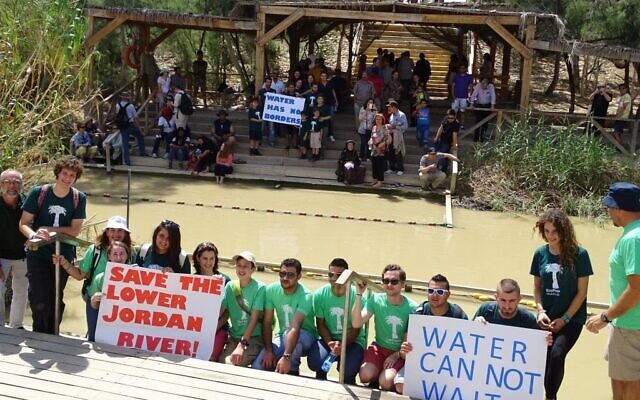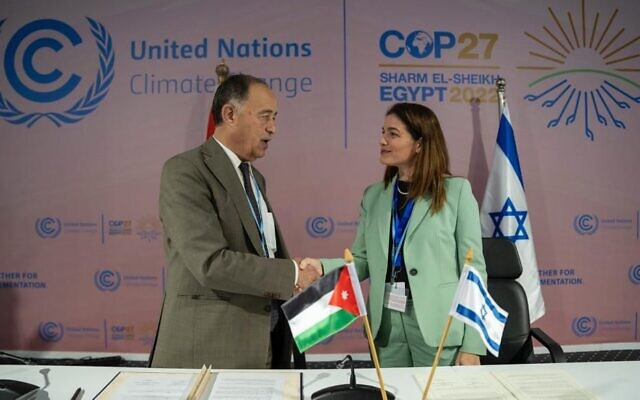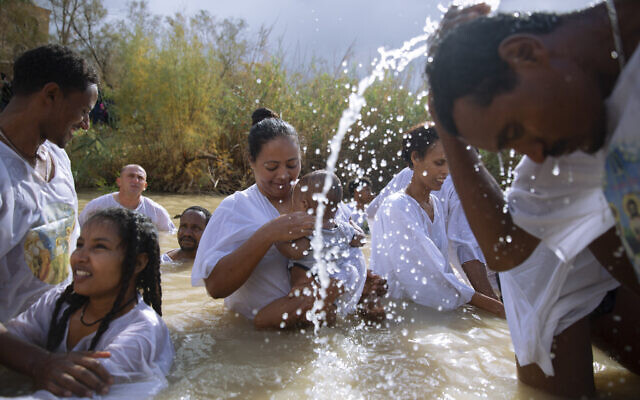Countries pledge to reduce pollution by treating wastewater, connecting towns to sewage infrastructure, rehabilitating ecology, and creating tourism sites and jobs

The Israeli and Jordanian governments signed a declaration of intent on Thursday to partner in the ecological restoration and sustainable development of the Jordan River.
The document was signed at the UN COP27 climate conference in the Egyptian resort of Sharm el-Sheikh by Environmental Protection Minister Tamar Zandberg and the Jordanian minister of water and irrigation, Mohammed Al Najer.
According to the Environmental Protection Ministry, restoration of the Jordan River is a major goal for both countries due to its great ecological value, its rich historical and religious heritage, and its importance as a major tourist site.
The agreement gives practical expression to Annex 4 of the 1994 Israel-Jordanian Peace Treaty, which contains clauses regarding environmental cooperation in the Jordan River. These include the ecological restoration of the waterway, protection of water resources from pollution, control of agricultural pollution and waste, pest control, the creation of nature reserves and protected areas, and tourism and historical heritage.
Gideon Bromberg, the Israel director of EcoPeace, a Middle East environmental peace organization, welcomed the agreement, saying, “The agreement signed today between Jordan and Israel should build on Peace Treaty commitments and the 2014 decision of the two governments that created a sub-committee on their Joint Water Committee, focused on rehabilitating the Jordan River.”
As part of Thursday’s agreement, Israel and Jordan jointly recognized that the restoration of the Jordan River requires cross-border action, and that rehabilitation will create new opportunities for cooperation between the countries, generate jobs, and improve quality of life for citizens living on both sides.

Both countries pledged to treat pollution in their respective territories, partly by building wastewater treatment facilities and connecting towns along the river to advanced sewage infrastructure. They will also improve the quality of the water that flows into what has become, in many parts, little more than a polluted, trickling stream.
The two sides also agreed to promote sustainable agriculture, with special emphasis on regulating agricultural runoff and reducing the use of chemical pesticides.
In addition to making plans for tourism on both banks, the two countries also committed to examining the creation of a regional research center and academic cooperation aimed at restoring the streams that run into the Jordan River.
In July, the Israeli government approved an ambitious plan to clean up a substantial stretch of the Jordan River, restore its once abundant nature, and develop tourism along its banks.

The segment of river to undergo rehabilitation, all of which is located within Israeli territory, runs from the Sea of Galilee to the point where the river meets the Bezek Stream, around 37 kilometers (23 miles) to the south. The plan was approved Sunday.
Bromberg pointed out that because of the transboundary nature of the river, rehabilitation south of Bezek Stream into the West Bank also required cooperation with the Palestinian Authority and the “full participation” of the 60,000 Palestinians living in the Jordan Valley.
The Environmental Protection Ministry said in a statement that the Jordan River’s restoration and protection from pollution were especially important given a climate change-driven decrease in rainfall, which means less water is available to the iconic waterway.
The Jordan River is important to the three Abrahamic faiths, and a particular pull for Christian pilgrims.
Jordan and Israel, together with the United Arab Emirates, also signed a memorandum of understanding at COP27 last week relating to a deal signed last year for the kingdom to supply Israel with solar energy, in return for Israel proving Jordan with desalinated water.
As reported by The Times of Israel
